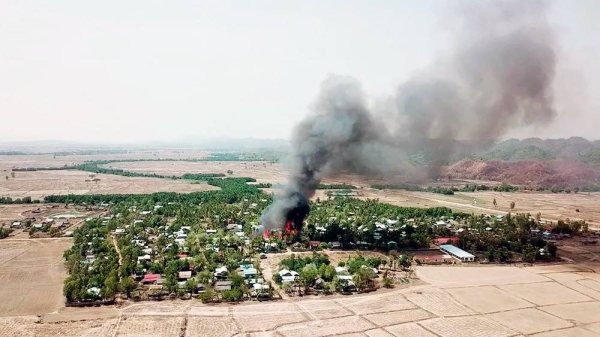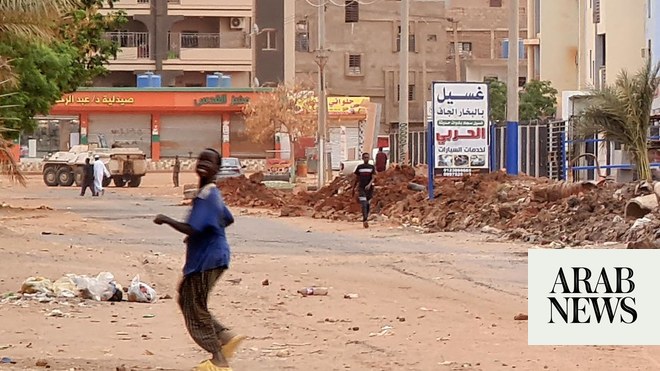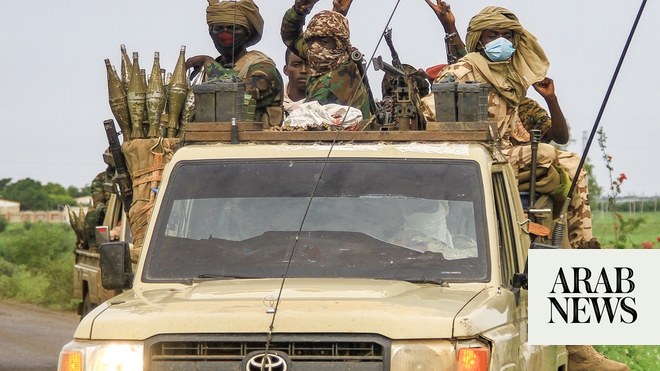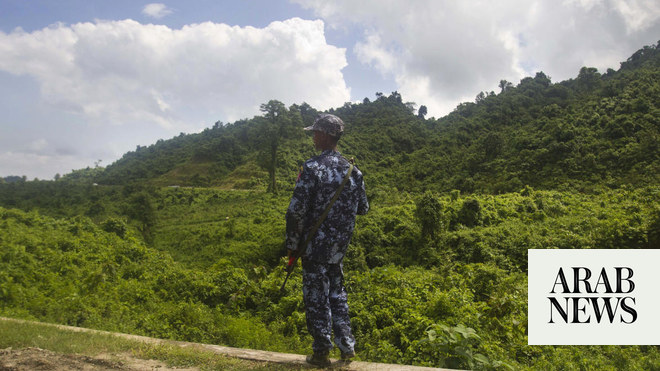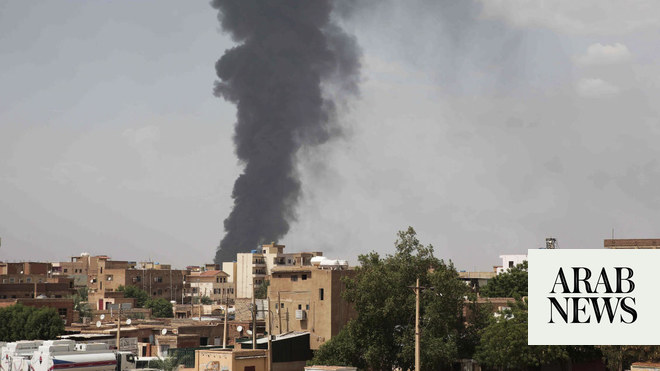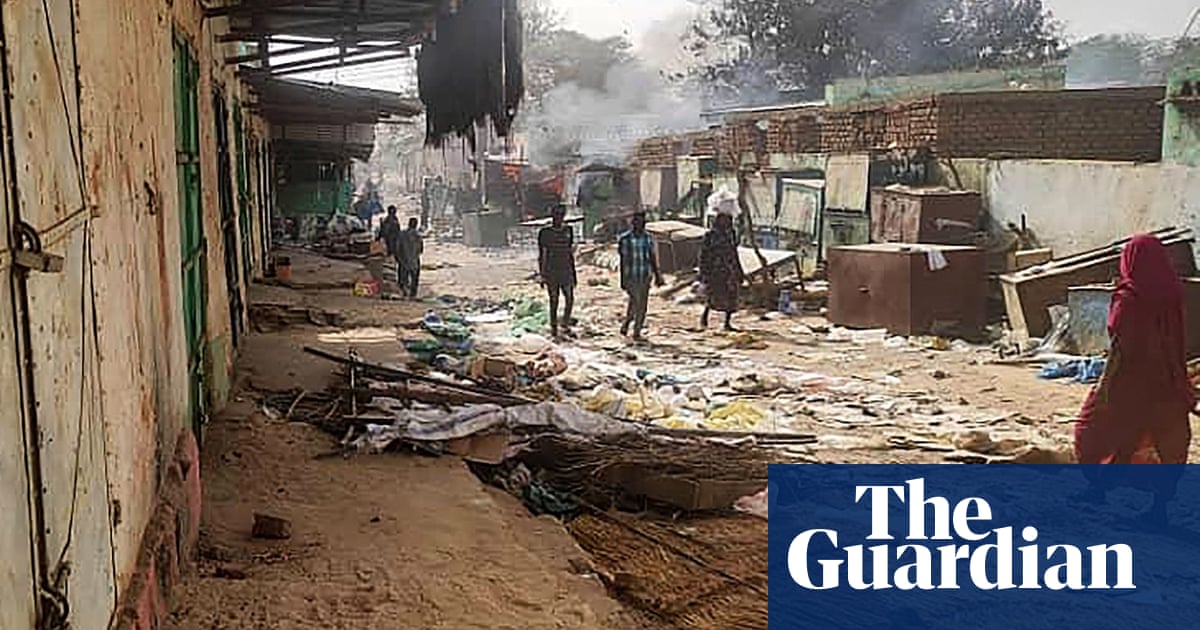
Fighting has erupted in Sudan’s Darfur region – including the use of heavy weaponry, and attacks on civilians and essential healthcare infrastructure – escalating a crisis now in its third week that was sparked by two rival generals.
Across the Sudanese capital, Khartoum, the sound of gunfire echoed through the streets throughout Sunday and airstrikes hit its twin city Omdurman.
A Jordanian public broadcaster showed images of the towering Sudanese central bank ablaze.
Sudan’s police force said it had deployed Central Reserve forces to the streets of Khartoum. That group last year faced sanctions from the US for serious human rights abuses related to its attacks on pro-democracy protesters and activists.
Gen Abdel Fattah al-Burhan, Sudan’s de facto head of state and head of the Sudanese Armed Forces (SAF), has nominally agreed to peace talks in South Sudan.
Gen Mohamed Hamdan Dagalo, known as Hemedti, said he and his Rapid Support Forces (RSF) paramilitaries would agree to talk only once a full ceasefire was respected.
“Cease hostilities. After that we can have negotiations,” he told the BBC. The RSF said the SAF had violated a fragile ceasefire with airstrikes and “indiscriminate shelling”.
Amid a communications blackout from much of Darfur, which is 500 miles west of Khartoum, evidence slowly emerged of widespread destruction, amid fears that fighting in the capital could enflame longstanding tensions in the region.
Toby Harward, the principal situation coordinator for UNHCR in Darfur, said: “[The UN refugee agency] is extremely concerned that if the fighting isn’t brought to an immediate end, it could unleash communal conflicts that will have an absolutely devastating effect on the very fragile social fabric of Darfur and risk repeating previous conflicts.”
Fighting between SAF and RSF militias broke out in two areas of Darfur during fierce battles in the capital earlier this month. A major hospital in North Darfur sustained damage and UN offices in two cities reported looting and destruction.
Community leaders in Darfur attempted to keep the peace on the ground despite increasing violence by local militias, sometimes with links to Khartoum.
Observers described increasing use of heavy weaponry by both the RSF and forces aligned to the SAF amid fears that other local militias across Darfur were arming themselves.
Late last week, the RSF commander Maj Gen Abdel Rahman Jumaa in West Darfur posted a video message to citizens and opposing forces as his troops held rifles in the background. “The RSF are winning on the ground,” he said. “Hemedti is the strong man that Sudan needs.”
Sporadic violence continued in al-Geneina in West Darfur close to the border with Chad, where schools, hospitals, public buildings and camps for those internally displaced were reduced to little more than burnt-out shells.
“There is complete destruction of key infrastructure in al-Geneina including local markets, a teaching hospital and gathering points,” said Mohamed Osman of Human Rights Watch. “It’s complete destruction on top of already poor infrastructure.”
Some in al-Geneina, including former medical workers, estimated that up to 250 people had been killed in recent violence.
“The worst day was on Thursday when at least 100 people were killed, mostly people who were already displaced by previous fighting living in camps,” said one former resident of al-Geneina who asked not to be named.
He told the Guardian that tribal militias had arrived from outside West Darfur to provide backing for the RSF, adding that internally displaced people had stormed a police station in order to take weapons and fight back after they were attacked.
“The police are few in number, and unable to fight the RSF to protect people,” he said. “But despite that, the RSF and their militias attacked them.”
Residents said that no hospitals or clinics were currently functioning in the town due to previous fighting, and that a doctor had been killed.
“Luckily there are some trained students who know how to administer first aid, otherwise the loss of life could have been much higher,” the resident said.
Bakheet Ali, 46, told the Guardian that he had been trapped for almost a week by recent fighting, and had only recently escaped to get food for his family. “We didn’t have food, we preferred to die of hunger than getting hit by a bullet on the street,” he said.
UNHCR said that at least 20,000 people had fled West Darfur and crossed into Chad, and that thousands more were expected to cross in the coming days.
The rise of the RSF and Hemedti is intimately linked to violence in Darfur under the reign of former dictator Omar Al Bashir, currently wanted by the international criminal court for perpetrating crimes against humanity and genocide in the region.
Bashir employed Hemedti and his militia, formerly known as the Janjaweed, to crush any potential revolt in the region using extreme violence.
Osman said the withdrawal of peacekeeping forces from the African Union and United Nations in the Darfur region two years ago meant that civilians were often left to fend for themselves as militias resupplied and increased recruiting.
Harward said that civilians remained vulnerable amid ongoing fighting in West Darfur.
“There is an obligation to protect civilians and refrain from attacks on schools, healthcare facilities. People need to be able to access food, fuel, medicine and other critical supplies,” he said.




